
It allows to keep PV going, with more focus towards AI, but keeping be one of the few truly independent places.
-
Sony Europe Press Release
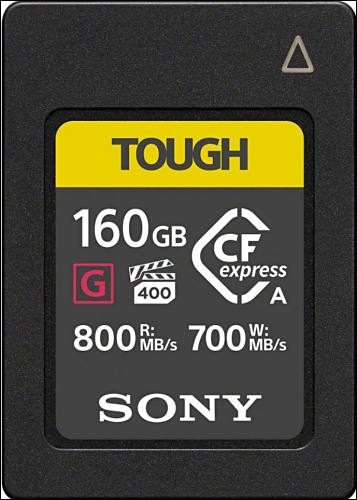
Specs
- Up to 700MB/s write speed and 800MB/s read speed
- Compact design and advanced functionality
- Effective heat dissipation design
- TOUGH specification construction ensures high durability and dust/water resistance
- Supported by File Scan Utility memory diagnostic software and Memory Card File Rescue data recovery software
Sony today announced a new generation of media - the world’s first CFexpress Type A memory cards, in both 80GB and 160GB, (CEA-G80T and CEA-G160T) as the most recent addition to Sony’s TOUGH specification cards. Delivering high transfer speed, durability and reliability, Sony’s new CFexpress Type A cards offer professional and stress-free performance for photographers and content creators.
High-speed Performance
Both the CEA-G80T (80GB) and CEA-G160T (160GB) use the latest flash memory control technology to achieve write speeds as high as 700MB/si and read speeds as high as 800MB/si, greatly reducing buffer clearing times for efficient, stress-free shooting. The CFexpress Type A cards are ideally suited for high-speed continuous shooting of more than 1,000 uncompressed RAW still images, as well as 4K 120p movie recording at high bit rates with the Slow & Quick Motion function[iii] when paired with new Alpha 7S III, which features two CFexpress Type A compatible media slots, that also support UHS-I and UHS-II SDXC/SDHC cards, for simultaneous media capture or extended continuous recording of even the highest bit rate data. Compliance with the VPG400 video performance guarantee profile specification ensures stable video recording at 400 MB/s—creating a smooth workflow for professional creators.
Effective Heat Dissipation Design
The new CFexpress Type A memory cards are equipped with a heat sink to transfer heat generated by the card to the exterior when transmitting large amounts of data at high speed, using Sony's original alloy with excellent thermal conductivity. This enables users to record for long periods of time[iv] even when recording 4K 120p video internally.
Tough Durability
Keeping up with Sony’s TOUGH specifications, the new CFexpress Type A memory cards feature bending and impact resistance to protect precious data, even when frequently changing cards in the harshest environments. They are up to five times more resistant to drop impact and up to ten times more resistant to bending, compared to CFexpress Type A requirement standards, for outstanding durability. In addition, thanks to a specialised internal structure, they achieve an IPX7 water ingress protection rating and an IP5X dust ingress protection rating (IP57) for enhanced durability.
Reliability
Accidents happen. Sony’s Memory Card File Rescue data recovery software allows users to recover accidently deleted RAW images and 4K video from memory cards. In addition, Sony’s Media Scan Utility media diagnostic software will be updated to support CFexpress Type A cards allowing users to diagnose and receive a warning before the number of read/write cycles approaches the card’s limit.
CFexpress Type A/SD Card Reader
Optimised for the new CFexpress Type A memory cards, the CFexpress Type A/SD card reader (MRW-G2) provides SuperSpeed USB 10Gbps (USB 3.2 Gen 2) transfer speed, via its USB Type-C® connector, allowing creators to establish an efficient workflow when dealing with high-resolution image files, 4K video and other types of high-volume data. When combined with a CFexpress Type A card, it allows users to transfer data approximately 2.8 times faster than with conventional media[vii]. The MRW-G2 card reader can be used with CFexpress Type A and SDXC/SDHC (UHS-I and UHS-II) memory cards.
**Pricing and Availability
CFexpress Type A memory cards and card reader will be available in Europe in September 2020. See below for suggested retail pricing:
- CEA-G80T: €230 / $199.99 USD (in foundation it has $25 SSD + 3D TLC in MLC mode drive)
- Such strange size comes from 120*2/3=80, exactly 128GB drive with little spare and TLC run in MLC mode
- CEA-G160T: €440 / $399.99 USD (in foundation it has $35 SSD + 3D TLC in MLC mode drive))
- Such strange size comes from 240*2/3=160, exactly 256GB drive with little spare and TLC run in MLC mode
- MRW-G2 Card Reader: €140 / $119.99 USD
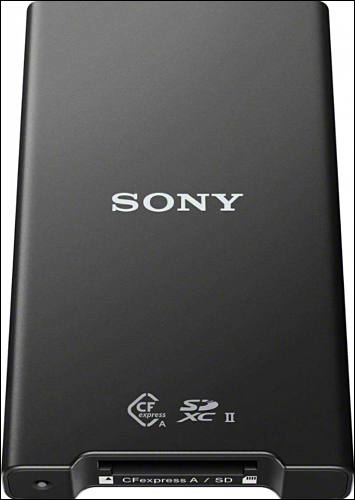

 sa13903.jpg357 x 500 - 33K
sa13903.jpg357 x 500 - 33K
 sa13904.jpg355 x 500 - 19K
sa13904.jpg355 x 500 - 19K -
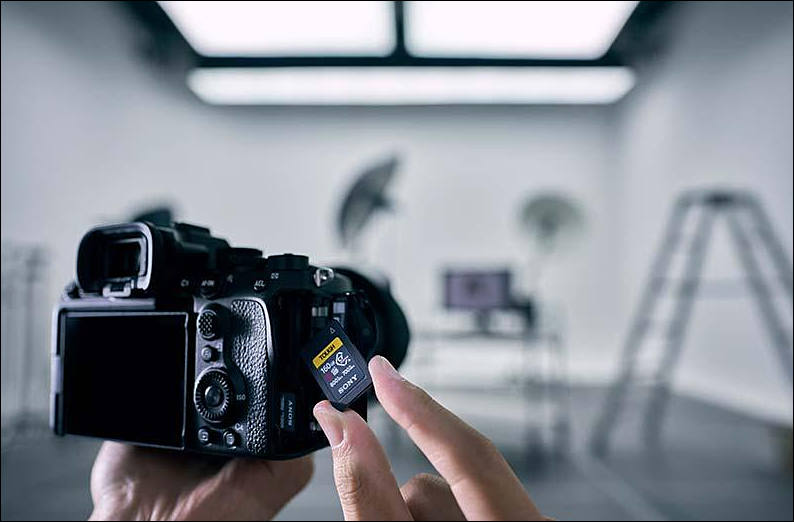
Main idea is that companies do not want to repeat error with previous SD cards where competition frequently dropped prices (this is why all 100% camera manufacturers ignore two last SD standard iterations!). Better keep it cameras only product and nice margins ala MemoryStick.

 sa13905.jpg794 x 522 - 47K
sa13905.jpg794 x 522 - 47K -
Form factor is extremely bad
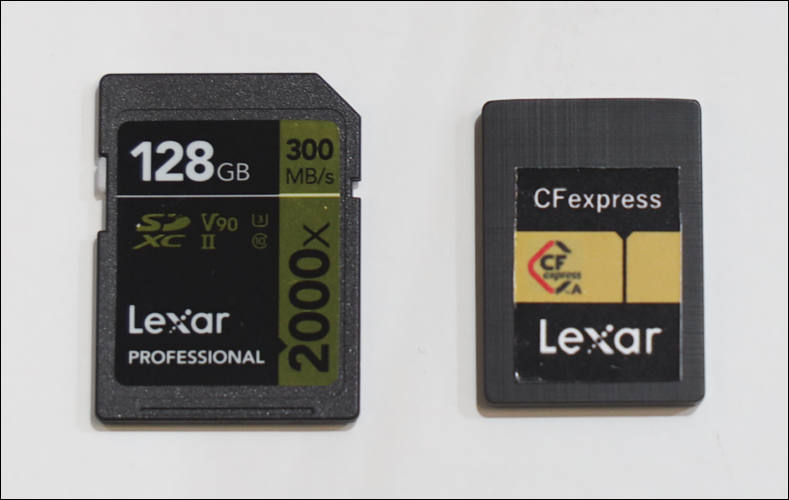
Cards are small and also lack any heat transfer ability (opposite to Sony PR claims).

 sa13937.jpg789 x 500 - 38K
sa13937.jpg789 x 500 - 38K -
In case you can't live another day without financing Sony top management another Lamborgini
Preorder links
- 80GB card
- 160GB card
- Reader
I try to never post words managers use to characterice customers of such products. This is bad nasty words.
-
More on cooling
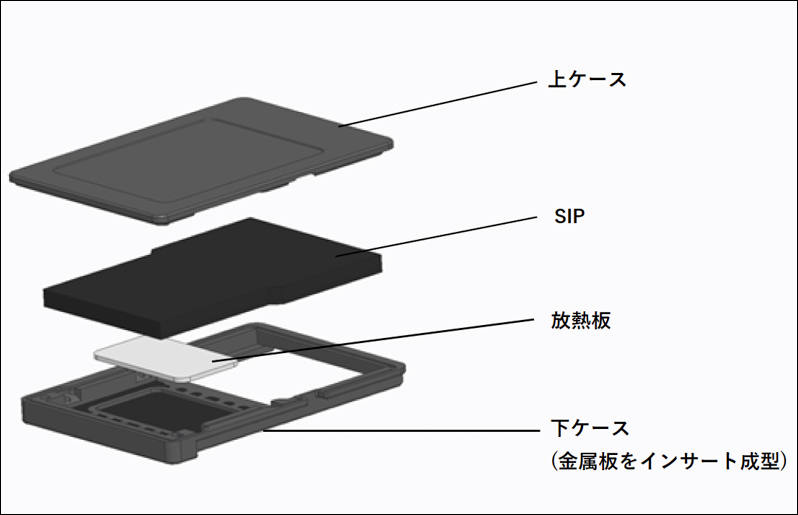
the company has adopted the "SIP structure" in which IC parts and memory are resin-encapsulated in one package for speeding up and improving durability, and a heat sink is placed between this SIP structure and the lower case.
So, "cooler" is small aluminium piece between two plastic parts.
Marketing just wanted something "cool" or it was ex designers of 6xxxx series who made all this.
Horrible engineering.

 sa13945.jpg798 x 515 - 34K
sa13945.jpg798 x 515 - 34K -
Compare to type B cards
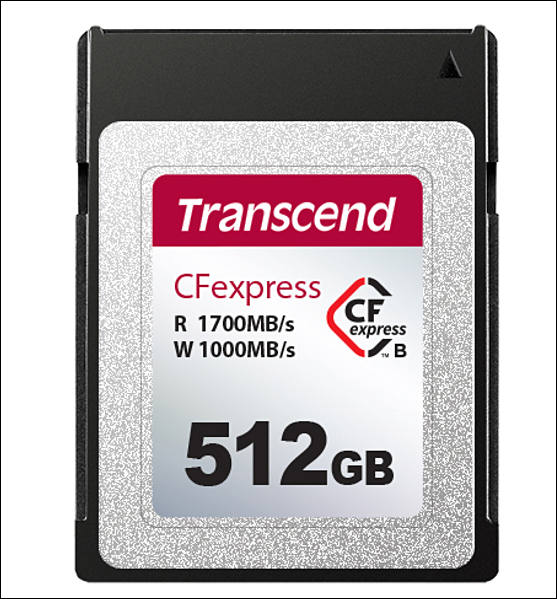
Here alu plate is large and directly connected via thermal interafce to chips.
Much much better, so avoid any cameras using Type A cards.

 sa13972.jpg557 x 599 - 61K
sa13972.jpg557 x 599 - 61K
Howdy, Stranger!
It looks like you're new here. If you want to get involved, click one of these buttons!
Categories
- Topics List23,992
- Blog5,725
- General and News1,354
- Hacks and Patches1,153
- ↳ Top Settings33
- ↳ Beginners256
- ↳ Archives402
- ↳ Hacks News and Development56
- Cameras2,367
- ↳ Panasonic995
- ↳ Canon118
- ↳ Sony156
- ↳ Nikon96
- ↳ Pentax and Samsung70
- ↳ Olympus and Fujifilm101
- ↳ Compacts and Camcorders300
- ↳ Smartphones for video97
- ↳ Pro Video Cameras191
- ↳ BlackMagic and other raw cameras116
- Skill1,960
- ↳ Business and distribution66
- ↳ Preparation, scripts and legal38
- ↳ Art149
- ↳ Import, Convert, Exporting291
- ↳ Editors191
- ↳ Effects and stunts115
- ↳ Color grading197
- ↳ Sound and Music280
- ↳ Lighting96
- ↳ Software and storage tips266
- Gear5,420
- ↳ Filters, Adapters, Matte boxes344
- ↳ Lenses1,582
- ↳ Follow focus and gears93
- ↳ Sound499
- ↳ Lighting gear314
- ↳ Camera movement230
- ↳ Gimbals and copters302
- ↳ Rigs and related stuff273
- ↳ Power solutions83
- ↳ Monitors and viewfinders340
- ↳ Tripods and fluid heads139
- ↳ Storage286
- ↳ Computers and studio gear560
- ↳ VR and 3D248
- Showcase1,859
- Marketplace2,834
- Offtopic1,320




